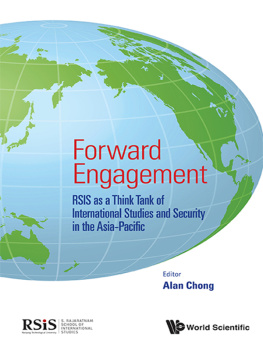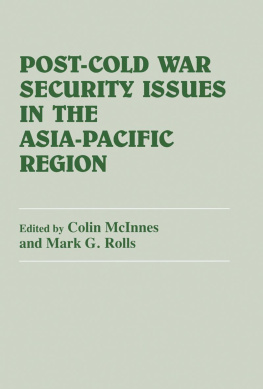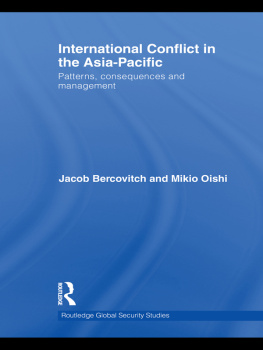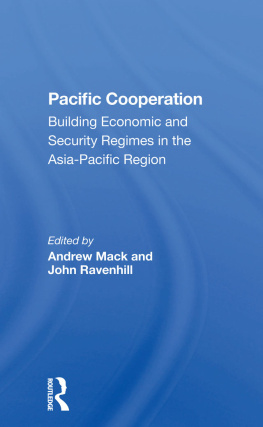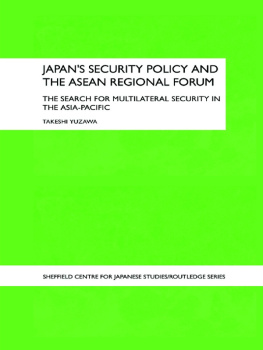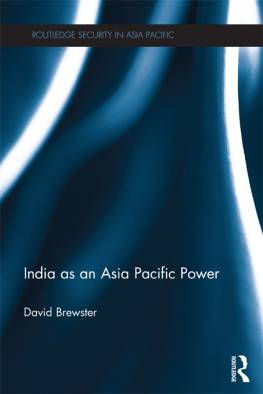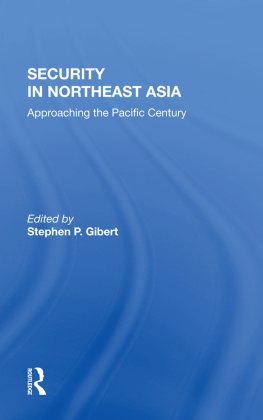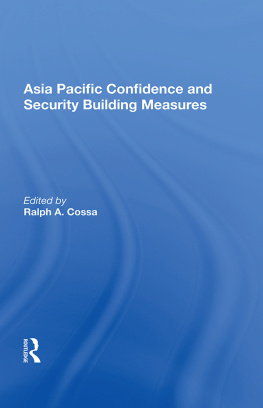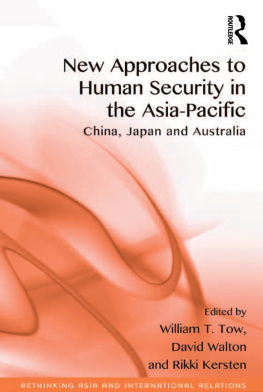Forward
Engagement
RSIS as a Think Tank of
International Studies and Security
in the Asia-Pacific
Forward
Engagement
RSIS as a Think Tank of
International Studies and Security
in the Asia-Pacific
Editor
Alan Chong
S. Rajaratnam School of International Studies, NTU, Singapore
Published by
World Scientific Publishing Co. Pte. Ltd.
5 Toh Tuck Link, Singapore 596224
USA office: 27 Warren Street, Suite 401-402, Hackensack, NJ 07601
UK office: 57 Shelton Street, Covent Garden, London WC2H 9HE
Library of Congress Cataloging-in-Publication Data
Names: Chong, Alan (Alan Chia Siong), editor. | Container of (work): Liow, Joseph Chinyong, 1972 Research at RSIS.
Title: Forward engagement : RSIS as a think tank of international studies and security in the Asia-Pacific / [edited by] Alan Chong.
Description: New Jersey : World Scientific, [2016]
Identifiers: LCCN 2016050518 | ISBN 9789813208469 (hardcover)
Subjects: LCSH: S. Rajaratnam School of International Studies. | Singapore--Foreign relations. | National security--Singapore. | Security, International--Asia. | Security, International--Pacific Area.
Classification: LCC DS610.45 .F67 2016 | DDC 355/.03355957--dc23
LC record available at https://lccn.loc.gov/2016050518
British Library Cataloguing-in-Publication Data
A catalogue record for this book is available from the British Library.
Copyright 2017 by World Scientific Publishing Co. Pte. Ltd.
All rights reserved. This book, or parts thereof, may not be reproduced in any form or by any means, electronic or mechanical, including photocopying, recording or any information storage and retrieval system now known or to be invented, without written permission from the publisher.
For photocopying of material in this volume, please pay a copying fee through the Copyright Clearance Center, Inc., 222 Rosewood Drive, Danvers, MA 01923, USA. In this case permission to photocopy is not required from the publisher.
Desk Editor: Karimah Samsudin
Printed in Singapore
Dedication
In Memory of our Founding
Director S. R. Nathan
Mr S. R. Nathan was conferred an honorary doctorate by the Nanyang Technological University on 6 December 2011.
Mr S. R. Nathan passed away on 22 August 2016. He lived a remarkable 92 years on earth. His contribution to Singapore and its humanity simply speaks for itself.
RSIS owes its successful existence to Mr Nathans devotion, energy and foresight. The Schools intellectual and strategic work has been guided by his vision and values. Mr Nathans commitment and loyalty to Singapore, in particular, his infectious belief in the countrys ability to solve the problems of its time, is a great inspiration to all of us in RSIS.
The challenge for RSIS is managing the impact of changes in geopolitics, economy and society. Understanding policy-making, and engagement of citizens and institutions were never far from Mr Nathans mind. His constant reminder to us to Ponder the Improbable leaves a deep imprint on the RSIS team as we go about our research and teaching.
RSIS will endeavour to inculcate in the younger generation of students and staff Mr Nathans penchant for incisive analysis, forward-looking views and strategic networking. It will not be easy to replicate his balance of diplomatic reality and intellectual pursuit which won RSIS the tremendous support of all its stakeholders to date. Still, As Mr Nathan puts it, what matters most is to make a commitment to get engaged, and start wherever you can but always learning on the job... often facing challenging responsibilities and accomplishing them even without much guidance from the top... Seize the moment and you will have a very challenging life ahead, full of great changes and interesting surprises.1
Ambassador Ong Keng Yong
Executive Deputy Chairman
S. Rajaratnam School of International Studies
December 2016
1 This is quoted from Mr Nathans acceptance speech on the occasion of the conferment of an honorary doctorate by Keio University of Japan on 12 May 2009.
Contents
Alan Chong
Joseph Chinyong Liow
Tan See Seng
Ralf Emitters
Kumar Ramakrishna
Barry Desker
Shashi Jayakumar
Rohan Gunaratna
Mohamed Alami Musa, Paul Hedges, and Mohamed Ali
Benjamin Ang and Tan Teck Boon
Mely Caballero-Anthony
Kwa Chong Guan
Tan Seng Chye
Jimmy Tan Cheng Yaw
Eddie Lim and Daniel Chua
Yang Razali Kassim and Mushahid Ali
Friedrich Wu
Ong Keng Yong
Introduction
Leadership and the Singaporean Think Tank
Alan Chong and Ong Keng Yong
T he conventional understanding of leadership is usually derived from a leaderfollower context. The follower responds to the leader because of his or her charisma, aura of invincibility, the ability to deliver welfare, or demonstrable scientific knowledge for the advancement of the collective good. In discussing leadership by a think tank, we are instead directing attention to the quest to assist good governance by offering illumination backed by specialised research. Think tank leadership is about delivering the processed raw ideas upon which the elected leaders make sound policies. For more than 20 years, the S. Rajaratnam School of International Studies (RSIS) took its mission cue from the founding philosophies of the nation.
Good Thinkers as Leaders with Foresight
It is no surprise that biographies of the late Dr. Goh Keng Swee, one of the architects of Singapores economy, education, and armed forces, have described him as a very thoughtful, profound thinker who never has any time for ordinary conversation [.] Hes a perfect committee man.1 Mohammed Sopiee, who served with Goh in the Malayan Forum of like-minded student nationalists in London, recalled of Goh: I think hes the thinker from whom the ideas come [.] Hes very practical and down to earth, a fascinating character.2 Likewise, the late Prime Minister Lee Kuan Yew kept emphasising the training of the mind for the rightly ordered government. Mr. Lee wrote in his biography that:
If there was one formula for our success, it was that we were constantly studying how to make things work, or how to make them work better. I was never a prisoner of any theory. What guided me were reason and reality. The acid test I applied to every theory or scheme was, would it work? [...] I discovered early in office that there were few problems confronting me in government which other governments had not met and solved. So I made a practice of finding out who else had met the problem we faced, how they had tackled it and how successful they had been. Whether it was to build a new airport or to change our teaching methods, I would send a team of officers to visit and study those countries that had done it well. I preferred to climb on the shoulders of others who had gone before us.3
Lees notion of reason and reality meant that he was prepared to evaluate ideas based on the force of logic and deep reflection. He was also prepared to implement schemes for Singapore based on the tests of provenance in other countries. Other countries mistakes should likewise serve as a learning point of what not to do.

